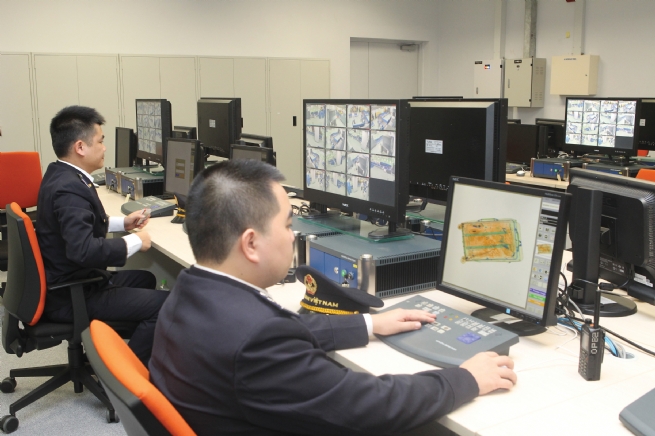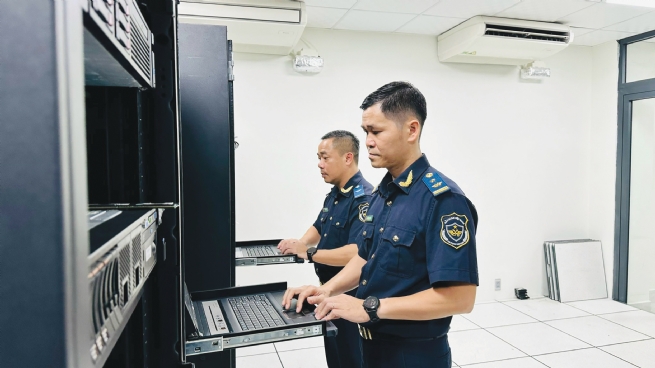9:43:09 AM | 10/10/2024
Implementing digital customs and smart customs is important for realizing Vietnam's digital transformation policy. This aligns with the ongoing trends in administrative procedure reform and the modernization of customs operations, enhancing efficiency and responsiveness in the sector.

The customs sector has proposed key solutions to enhance state management and advance digital and smart customs
Digital transformation - a key task
Recently, the General Department of Vietnam Customs organized a preliminary review of its digital transformation efforts. This included the introduction of a comprehensive business model for digital and smart customs, as well as the dissemination of new regulations on financial management.
Leaders of the General Department of Vietnam Customs emphasized that implementing digital transformation in the customs sector is both an important requirement and a key task, reflecting global trends in customs operations, particularly in developed countries, and aligning with the goals set forth in Vietnam’s customs reform, development and modernization process.
In recent times, the customs sector has achieved remarkable results in digital transformation. However, to fully realize the goals of implementing digital and smart customs, there is still a considerable workload ahead. This requires more effort and determination from all civil servants, public employees and workers in the sector. Leaders in the customs sector stress the importance of thoroughly understanding guiding documents and resolutely and effectively executing tasks related to digital transformation. In particular, there is an urgent need to implement digital customs and smart customs according to the established timeline, ensuring that quality standards are met.
Three important tasks on digital transformation
Le Duc Thanh, Director of the Department of Customs Information Technology and Statistics at the General Department of Vietnam Customs, presented a report on the results of digital transformation efforts during the first six months of the year. He also outlined the direction for the orientation for the last six months of 2024.
In the first months of 2024, the General Department of Vietnam Customs maintained its focus on leading and directing digital transformation development. This included issuing comprehensive guidelines for managing plans, consolidating the Steering Committee, and organizing meetings to ensure effective implementation of digital transformation development.
According to Thanh, the three key tasks in implementing digital transformation in the customs sector include building a strong information technology system; facilitating connection and data sharing between the IT system of the General Department of Vietnam Customs and the National Population Database (Project 06 of the Government); deploying the National Single Window Mechanism and the ASEAN Single Window Mechanism.
In addition, the customs sector has worked hard to ensure the security and safety of the VNACCS/VCIS System and its satellite information technology systems. Efforts also include the development and deployment of a document management and operation system for both the General Department of Vietnam Customs and local customs departments.
From now until the end of the year, the customs sector will concentrate on effectively executing digital transformation tasks. These include improving the legal environment and processes to align with the requirements of digital transformation in customs. The sector will also integrate online public services on the National Single Window Portal with the National Public Service Portal. Other key tasks involve deploying digital border gates and digital seaports, building a strong information technology system, and implementing Project 06 of the Government, as well as the National Single Window and ASEAN Single Window mechanisms.

Digital transformation in the customs sector is an important requirement and a key priority
Building digital customs, smart customs in line with international standards
At the conference, Au Anh Tuan, Director of the Customs Control and Supervision Department at the General Department of Vietnam Customs, introduced the overall business model for digital and smart customs. The primary objective of this model is to leverage new technological advancements in accordance with international standards, thereby meeting the demands of smart governance.
The management of enterprises, import-export, and transit goods, as well as the oversight of means of transport entering, exiting, and transiting, will be comprehensively handled. The goal is to stabilize operations, enhance automation beyond current systems, and address the shortcomings of existing information technology. This system will have the capacity to integrate, connect and share information with ministries, agencies and businesses through the National Single Window Mechanism, while also being prepared to exchange customs data with regional and global partners.
With these objectives, digital customs and smart customs will be developed to meet the requirements for processing customs procedures and supervision for exported, imported and transit goods. This will include overseeing transport vehicles and passenger luggage on a digital platform that integrates satellite systems, ensuring that all customs procedures are managed within a single system. The creation of a unified, comprehensive database will enhance customs management, optimize resource utilization, and provide convenience for customs declarants.
By Le Hien, Vietnam Business Forum